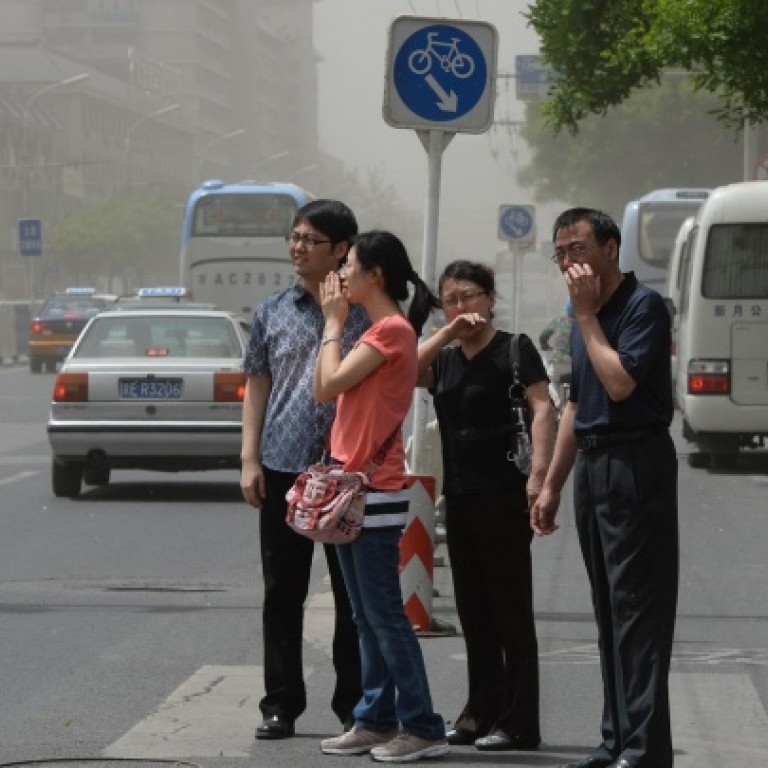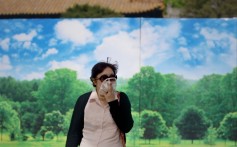
'Growth first' mentality undermines China's war on pollution
Action to fight mainland's losing war against pollution is being thwarted by lack of penalties and officials more focused on economic growth
After most cities in northern China choked on thick smog for most of the winter, the mainland's environment ministry has come up with its own theme for World Environment Day today - "breathing the same air and working together".
The official theme promoted by the UN Environment Programme this year - Think.Eat. Save - focuses on cutting food waste.
The mainland theme ties in with the regular rhetoric of senior environmental officials and even top leaders that the country faces a prolonged and arduous battle - 20 years or more by some estimates - to remedy its severe air pollution and that city dwellers should accept greater responsibility by driving less and eating less barbecued food.
But the central government's commitment to cleaning up the toxic smog has been called into question by the State Council's failure to approve a highly anticipated national action plan on air pollution control in time for the World Environment Day.

A draft was ready for State Council review as early as April, and contained some elements that help curb air pollution. But the delay suggests the plan could have met strong opposition from other ministries, which are heavily influenced by state-owned enterprises (SOEs) or local authorities focused on economic growth.
For instance, Zhang wanted to reduce pollution sources by eliminating overcapacity of some heavy industries, such as iron and steel - a move that could kill two birds with one stone.
A source briefed about the draft plan said Hebei province, which burns about 300 million tonnes of coal a year and is responsible for about a fifth of the airborne pollutants that drift across Beijing, had come under strong pressure to rein in its ill-disciplined steel industry.
"There was a proposal for Hebei to slash about 100 million tonnes of steel production, but that might be too aggressive a target for the province," the source said. Hebei governor Zhang Qingwei said in March the province aimed to shed 60 million tonnes of its steel production capacity.
The draft plan also proposed stricter limits on coal consumption in the major urban clusters that suffer the most from air pollution: the Beijing-Tianjin-Hebei area, Yangtze River Delta and Pearl River Delta.
The central government has set a non-binding target to limit the country's total energy consumption to 4 billion tonnes of coal equivalent by 2015.
Local governments have been allocated breakdowns of the target but will not receive any penalty if they exceed their individual targets. The environment ministry has been seeking to make such goals binding in at least the three major urban clusters.
"Whether these proposals will appear in the final version of the action plan remains unknown after such a long delay, but these are the solid measures that can bring substantial effects," the source said.

Zhou Rong , a climate and energy campaigner with Greenpeace, said such "adjustment" suggested the old bargaining game among ministries and local governments had returned as they fought to protect their own interests, and that how strong the action plan turned out might depend on the political will of the top leadership.
"I'd rather see a fully fledged action plan that can make real differences than a compromised version, even if that means more time is needed to make a bargain," Zhou said.
She also said the environment ministry and local governments should stay true to their promises and ensure the accuracy and transparency of air pollution data.
The ministry previously asked the three key regions to cut levels of PM2.5 - superfine airborne pollutants that are most harmful to human health - by 6 per cent by 2015 from 2010 levels.
However, the mainland did not start to monitor the pollutant publicly until 2012, and a baseline concentration was never announced, leaving plenty of room for massaging the data, Zhou said.

